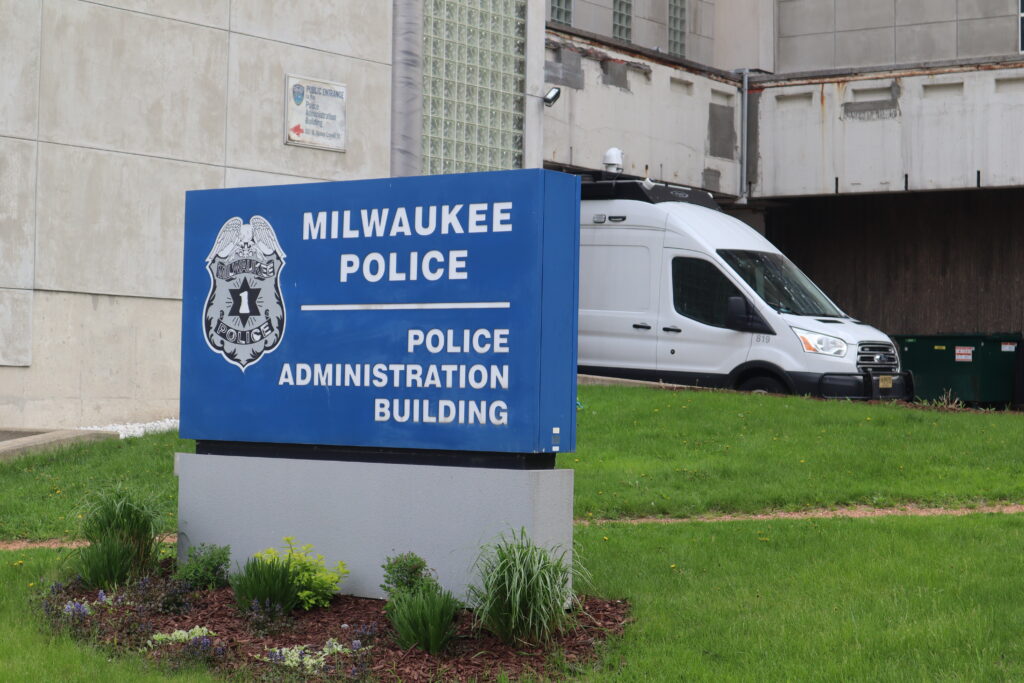Milwaukee Police Seek ‘Open Source Intelligence Tool’ for RNC
'It snoops on everyone, regardless of any connection to a crime,' critic charges.

The Milwaukee Police Administration Building downtown. A surveillance van, or “critical response vehicle” is in the background. (Photo | Isiah Holmes)
The Milwaukee Police Department (MPD) is seeking to acquire an “open source intelligence tool” in time for the Republican National Convention (RNC) in July. A notice to solicit potential vendors was issued by the city of Milwaukee on Tuesday, March 26, outlining requirements any product would need to meet to be considered. The chosen product will add to local law enforcement agencies’ intelligence-gathering tools during the political convention.
The information derived through OSINT is much more than one can find through simple Google searches or looking at public Facebook posts or accounts, according to advocates who have raised concerns about the practice, especially when combined with the capabilities and access to information granted to law enforcement agencies.
“People understand that what I put out publicly can be looked at by anybody, including law enforcement,” Tim Muth, staff attorney for the American Civil Liberties Union (ACLU) of Wisconsin, told Wisconsin Examiner. “What they don’t realize is that law enforcement is obtaining tools like this one that use artificial intelligence to create connections and links to track … who are all the different people, who are the friends, or have liked or commented on your profiles, and who are they connected to.”
By doing this, law enforcement can build models of a community and create profiles based on a person’s online activity and the online activity of the people that person interacts with, Muth said.
“That’s what the public doesn’t understand,” he explained. “They understand that the police can look at your Facebook page, or at least whatever you have as a public setting. And they might even understand that the police can get a warrant to look at the private stuff. But they don’t understand that the police have these tools that go much beyond that.”
Collecting intel to what end?
Request For Proposal (RFP) documents shared with Wisconsin Examiner by the ACLU shed light on exactly what MPD is after. The ACLU noticed the request on the city’s online portal which tracks bid opportunities for the RNC. An addendum document from March 26 stated the department wanted an OSINT tool “for link analysis.” The document further explained that link analysis, “involves social media connections from one person or group to another.” Exactly how much money has been set aside to purchase the tool hasn’t been disclosed. However, the tool is likely to be purchased using the $75 million in federal assistance set aside for security at the RNC. Furthermore, the addendum document notes that it’s unclear how much the OSINT tool would be used leading up to and during the RNC. “The volume of investigations is a bit of an unknown,” the document reads. “The tool will be used to proactively identify threats to the RNC. Investigations will be driven by intelligence we receive on threats.”
A 10-page RFP document states that the goals of the OSINT project are to:
- Seamlessly search across a large number of platforms and data sources.
- Reduce the amount of labor hours spent searching.
- Protect from threats in a timely manner.
MPD, according to the document, is seeking five licenses for an OSINT tool. A list of technical requirements are also provided including the abilities to :
- Merge OSINT with other Geographic data to provide geo-location tags on particular sources; the ability to obtain real-time updates/alerts for “identified threat actors.”
- Reveal/decipher hidden connections/relationships online.
- Collect/identify data from different languages.
- Safely extract data from the dark web.
- Provide data visualizations to help interpret findings and connections.
- Generate intelligence insights.
- Detect illegal activities.
- Identify connected and emerging threat phases.
Since a tool has yet to be purchased, not much is known about what capabilities the proposed technology would have. “We are exploring options regarding an open-source investigative tool,” an MPD spokesperson told Wisconsin Examiner. “We do not own it and cannot really state how it will be used until we receive results back regarding the capabilities.”
The use of artificial intelligence by law enforcement, including MPD, isn’t well understood. Earlier this month, MPD Chief Jeffrey Norman also alluded to debates within the law enforcement profession about the benefits and dangers of using artificial intelligence. Norman’s comments came in response to questions from Wisconsin Examiner about the MPD’s Predictive Intelligence Center, listed as part of the department’s Fusion Center, an intelligence-gathering hub which focuses on homeland security, counter-terrorism and local crime. Wisconsin Examiner learned about the Predictive Intelligence Center through open records requests to the state’s Homeland Security Council. The Predictive Intelligence Center “provides opportunities for offender identification, enhances investigative leads, and can connect offenders to networks of co-conspirators,” according to those records.
Besides predictive intelligence, MPD’s fusion center also has a Virtual Investigations Unit which focuses on online investigations. In 2020, when protesters took to the streets calling for police reform for over a year — and as the city adjusted to a downsized Democratic National Convention during the height of the COVID-19 pandemic — the fusion center used OSINT and other methods to gather intelligence about the marches and unrest.
During 2020, Wauwatosa PD utilized OSINT, as well as law enforcement databases, to compile a list of nearly 200 people whom police perceived as being involved in, or related to, protest activity. The list included protesters who marched for police reform as well as lawyers, elected officials, photographers, a Wisconsin Examiner journalist and others. The list was referred to internally as a “target list” and was created shortly before Wauwatosa enacted a curfew for protest activity later that fall. In 2023, a federal jury ruled that police had not violated certain privacy protections by creating the list, and sharing it with numerous local, state, and federal agencies. The trial also revealed that law enforcement utilized fake social media accounts to monitor people.
It wasn’t just people in Milwaukee and Wauwatosa who began noticing what they felt were signs of police surveillance. “We saw some examples of what government was doing at the time of the Kenosha protests back in 2020, and the technology, especially with the growth of artificial intelligence tools, has only gotten leaps and bounds more sophisticated than it was four years ago,” said Muth.
Muth is also concerned that, as happened after the downsizing of the 2020 DNC, purchases for technology made for the RNC will remain long after the political event ends. “What we’re really calling for is transparency,” said Muth. “That the police identify what tools they are obtaining; who are using the tools, what are the boundaries around the information that is collected, how long it is collected for, what it can be used for, all of that needs to be transparent with citizen oversight. Not just oversight by somebody higher up within the police department.”
Transparency is needed
Citizen oversight of police activity, let alone surveillance technologies, has been in limbo since the passage of a deal on shared revenue and taxes in Milwaukee. The deal, struck between local elected leaders, Democratic Gov. Tony Evers and the Republican-controlled state Legislature, allowed the Milwaukee area to avoid fiscal catastrophe. In return, the city’s Fire and Police Commission, once one of the most powerful of its kind nationwide, was stripped of its ability to set policy for the MPD. Some local policy decisions were reversed as part of the deal, including removing school resource officers from local schools. The city must also maintain its current levels of police, canceling future proposals to divert police budgets to fund other struggling city services.
Milwaukee police seek ‘open source intelligence tool’ for RNC was originally published by Wisconsin Examiner.
More about the 2024 RNC
- RNC Host Donates More Than $5 Million To Milwaukee Organizations - Jeramey Jannene - Jul 30th, 2025
- RNC Report Says Convention Had $321 Million Economic Impact - Jeramey Jannene - May 20th, 2025
- No Charges Against Columbus Police in RNC Shooting - Isiah Holmes - May 6th, 2025
- Tourism Spending Dipped During Republican Convention in Milwaukee - Evan Casey - Mar 18th, 2025
- Host Committee Raised $92 Million for RNC in Milwaukee - Evan Casey - Nov 27th, 2024
- Officials Admit RNC Issues, But Say Event Was Success - Jeramey Jannene - Oct 1st, 2024
- Council members seeking information on fatal shooting during RNC, details on convention-related arrests, economic impact - Milwaukee Common Council - Jul 23rd, 2024
- Photo Gallery: Scenes from the RNC - Urban Milwaukee - Jul 19th, 2024
- Hulk Hogan, Kid Rock and Donald Trump, Final Day of RNC Veered All Over - Jeramey Jannene - Jul 19th, 2024
- Trump to Wisconsin – ‘I Am Trying To Buy Your Vote’ - Jeramey Jannene - Jul 18th, 2024
Read more about 2024 RNC here






















My guess is they’re buying Palantir licenses. Palantir is Peter Thiele’s company. It exists to stitch together databases and CCTV feeds around the country to monitor in realtime.
Yeah, spooky Palantir, run by creepo Peter Theile. “Inspector Gadget” Gallagher’s new employer and huge threat to our privacy. Yuck!